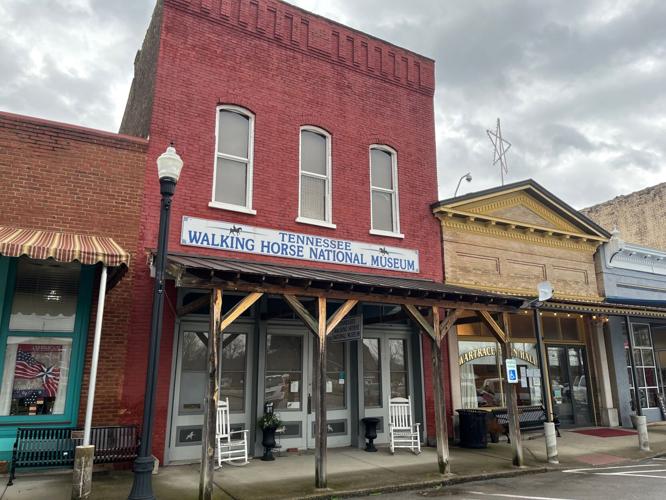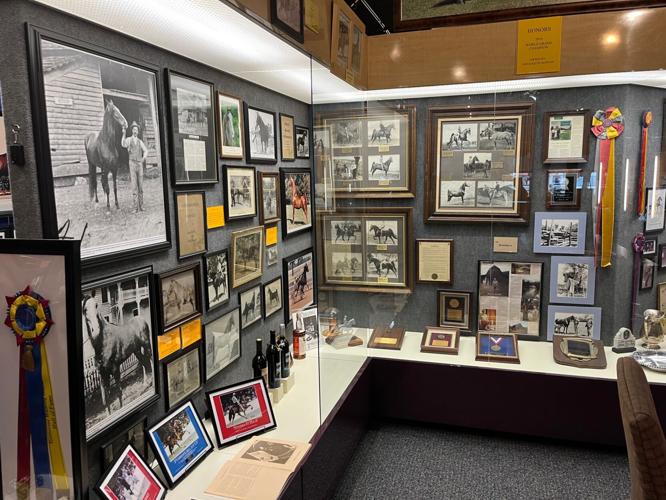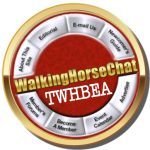Welcome! You do NOT have to be a WHC member to use these free forums!
We want your opinion!
Yes just like Facebook, You can post anonymously!
To Post please Login or Register to create posts and topics.
Hitting the Road: Tennessee Walking Horse National Museum
Quote from WalkingHorse.Chat Staff on March 28, 2023, 6:02 pmHitting the Road: Tennessee Walking Horse National Museum
- REPRODUCED FROM MANCHESTER TIMES
- NATHAN HAVENNER Staff Writer
- Mar 23, 2023 Updated Mar 23, 2023
The Tennessee Walking Horse National Museum, 27 Main St. E., Wartrace, pays homage to the history of the iconic Tennessee Walking Horse.
The Tennessee Walking Horse National Museum in Wartrace houses a one-of-a-kind collection of memorabilia related to the breed.
The “Ladies, Leaders and Legends” exhibit at the Tennessee Walking Horse Museum celebrates the achievements of women in Tennessee Walking Horse competition. The museum’s pays tribute to the women who have competed with the Tennessee Walking Horse throughout the decades, including the first female Grand Champion, Betty Sain, who took home top honors in 1966.
Known as “the cradle of the Tennessee Walking Horse,” the town of Wartrace, Tennessee continues to celebrate the iconic horse breed, and is home to a museum unlike any other in the nation.
Located at 27 Main St. E. in a historic downtown building, the Tennessee Walking Horse National Museum pays homage to the beloved horse breed, and the individuals that have dedicated their lives to furthering the breed.
Museum President Frances Bates said that while Wartrace did not “birth the baby,” but “raised him.”
Known as a gaited horse, the Tennessee Walking Horse is known for its unique motion, where they propel themselves with their hind legs.
“They are pushing and pulling off the back end, and their front feet they are basically just trying to get them out of the way of the back feet,” Bates said. “Each time that back foot comes up the head goes down and when they pull, the head comes up, this foot down, pull, so with each step they take their head nods. That is a signature of the breed.”
Bates said during the late 1800s and early 1900s, horse owners in Wartrace took gaited horses that had a good rear motion and bred them with mares that showed the same tendencies.
Founded in 2011, the museum houses a large collection of historic artifacts and memorabilia of the horse, including items from the family that bred what is considered to be the very first of the Tennessee Walking Horses, Allen F-1.
One hallmark of the museum is a collection of breeding books owned by Allen F-1’s owner, Charles Brantley. The books date from 1903 to about 1939, and document the early history of the breed.
The museum is also home to a small cherry table from the Coffee County home of James Brantley, that once stored the family’s Tennessee Walking Horse breeding books.
“In the mid-1930s, the house was hit by lighting and caught on fire, well everybody was gone, they heard about it and came running home and one of the only things that was saved was this little cherry table,” Bates said. It was by the front door, so they just picked it up and grabbed it and threw it out in the yard.”
It would be years before anyone would think to open the locked drawer in the cherry table.
“Apparently the key was lost,” Bates said. “They thought that the only picture of James Brantley was in this drawer, so they busted the top of the table out to get into the drawer and they found all these books and the picture and some other horse papers too.”
After spending years in an attic, the books along with the table, were donated to the Tennessee Walking Horse National Museum for permanent display.
The museum’s “Ladies, Leaders and Legends” exhibit pays tribute to the women who have competed with the Tennessee Walking Horse throughout the decades, including the first female Grand Champion, Betty Sain, who took home top honors in 1966.
The exhibit also features a silver rhinestone suit worn by 1961 Amateur World Grand Champion Deedy Decker.
“It weighs 34 pounds and is solid rhinestone,” Bates said. “The same people that used to make the suits for Porter Wagoner made this.”
Bates said the coat was a present to Decker from her father, who surprised her with the coat in the horse ring one day.
“She only weighed 98 pounds,” Bates said. “They bring the coat out, she gets all excited and everything, but she can’t get on her horse because she suddenly weighs 132 pounds instead of 98.”
Decker solved the problem by getting on her horse before being handed the jacket to put on.
Bates said the Tennessee Walking Horse still has a presence in Wartrace, which continues to host The Wartrace Horse Show each August.
“It has been every year since 1906, even during the war, even during COVID-19, there has always been a horse show here and it is the oldest one night horse show in Tennessee,” she said.
The Tennessee Walking Horse National Museum is open 10 a.m. until 4 p.m. on Fridays and Saturdays. For more information about the museum, or for volunteer opportunities, visit the Tennessee Walking Horse Museum Facebook page.
Hitting the Road: Tennessee Walking Horse National Museum
- REPRODUCED FROM MANCHESTER TIMES
- NATHAN HAVENNER Staff Writer
- Mar 23, 2023 Updated Mar 23, 2023

The Tennessee Walking Horse National Museum, 27 Main St. E., Wartrace, pays homage to the history of the iconic Tennessee Walking Horse.

The Tennessee Walking Horse National Museum in Wartrace houses a one-of-a-kind collection of memorabilia related to the breed.

The “Ladies, Leaders and Legends” exhibit at the Tennessee Walking Horse Museum celebrates the achievements of women in Tennessee Walking Horse competition. The museum’s pays tribute to the women who have competed with the Tennessee Walking Horse throughout the decades, including the first female Grand Champion, Betty Sain, who took home top honors in 1966.
Known as “the cradle of the Tennessee Walking Horse,” the town of Wartrace, Tennessee continues to celebrate the iconic horse breed, and is home to a museum unlike any other in the nation.
Located at 27 Main St. E. in a historic downtown building, the Tennessee Walking Horse National Museum pays homage to the beloved horse breed, and the individuals that have dedicated their lives to furthering the breed.
Museum President Frances Bates said that while Wartrace did not “birth the baby,” but “raised him.”
Known as a gaited horse, the Tennessee Walking Horse is known for its unique motion, where they propel themselves with their hind legs.
“They are pushing and pulling off the back end, and their front feet they are basically just trying to get them out of the way of the back feet,” Bates said. “Each time that back foot comes up the head goes down and when they pull, the head comes up, this foot down, pull, so with each step they take their head nods. That is a signature of the breed.”
Bates said during the late 1800s and early 1900s, horse owners in Wartrace took gaited horses that had a good rear motion and bred them with mares that showed the same tendencies.
Founded in 2011, the museum houses a large collection of historic artifacts and memorabilia of the horse, including items from the family that bred what is considered to be the very first of the Tennessee Walking Horses, Allen F-1.
One hallmark of the museum is a collection of breeding books owned by Allen F-1’s owner, Charles Brantley. The books date from 1903 to about 1939, and document the early history of the breed.
The museum is also home to a small cherry table from the Coffee County home of James Brantley, that once stored the family’s Tennessee Walking Horse breeding books.
“In the mid-1930s, the house was hit by lighting and caught on fire, well everybody was gone, they heard about it and came running home and one of the only things that was saved was this little cherry table,” Bates said. It was by the front door, so they just picked it up and grabbed it and threw it out in the yard.”
It would be years before anyone would think to open the locked drawer in the cherry table.
“Apparently the key was lost,” Bates said. “They thought that the only picture of James Brantley was in this drawer, so they busted the top of the table out to get into the drawer and they found all these books and the picture and some other horse papers too.”
After spending years in an attic, the books along with the table, were donated to the Tennessee Walking Horse National Museum for permanent display.
The museum’s “Ladies, Leaders and Legends” exhibit pays tribute to the women who have competed with the Tennessee Walking Horse throughout the decades, including the first female Grand Champion, Betty Sain, who took home top honors in 1966.
The exhibit also features a silver rhinestone suit worn by 1961 Amateur World Grand Champion Deedy Decker.
“It weighs 34 pounds and is solid rhinestone,” Bates said. “The same people that used to make the suits for Porter Wagoner made this.”
Bates said the coat was a present to Decker from her father, who surprised her with the coat in the horse ring one day.
“She only weighed 98 pounds,” Bates said. “They bring the coat out, she gets all excited and everything, but she can’t get on her horse because she suddenly weighs 132 pounds instead of 98.”
Decker solved the problem by getting on her horse before being handed the jacket to put on.
Bates said the Tennessee Walking Horse still has a presence in Wartrace, which continues to host The Wartrace Horse Show each August.
“It has been every year since 1906, even during the war, even during COVID-19, there has always been a horse show here and it is the oldest one night horse show in Tennessee,” she said.
The Tennessee Walking Horse National Museum is open 10 a.m. until 4 p.m. on Fridays and Saturdays. For more information about the museum, or for volunteer opportunities, visit the Tennessee Walking Horse Museum Facebook page.



